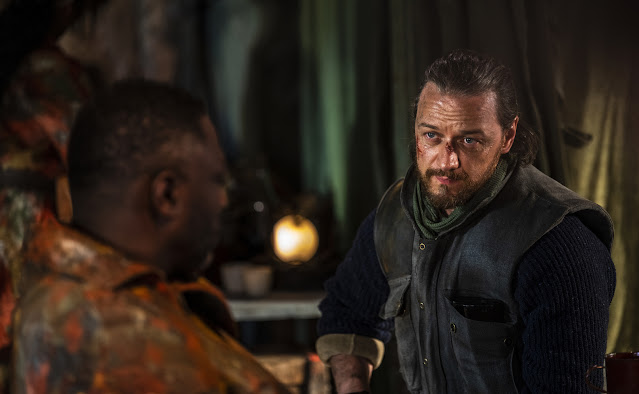How could His Dark Materials be adapted as anything but a television series? The epic scale of the novels may suggest that it should be made for the biggest screen possible, but the sprawling narrative lends itself more towards long-form storytelling, which fits in perfectly with the seemingly unlimited medium of television. Perhaps that’s why the televised co-production between the BBC and HBO has proven to be so successful over the last three years while the 2007 film adaptation of The Golden Compass (the series’ first book) bombed at the box office and never got a continuation.
That long-form storytelling has now paid off in the semblance of the television series’ third and final season, which adapts Phillip Pullman’s third novel The Amber Spyglass. It’s the culmination of dramatic season-long build-up which only began to make itself fully clear near the middle of Season Two, but which incorporates the series’ longer-running plotlines and characters thought to be long-forgotten. In this way, the final season does what any climax should, bringing together everything that has come before in an effort to tie it up in a satisfying manner.
The third season of His Dark Materials also works very well dramatically because, unlike with previous seasons when we knew there was still story left to tell, anything can happen from this point forward. All bets are off, which raises the stakes considerably as it takes leaps and bounds towards an exciting end.
“There’s a great war coming” seems to be the mantra of almost every single character this season, as most of the eight episodes act as a build-up on its own to the promised conflict. The mission of Lord Asriel (James McAvoy, returning to a starring role with a powerhouse performance) is now in full swing, as he recruits followers and makes bold moves against the Kingdom of Heaven. Fascinating religious elements are introduced as we learn that the Authority (‘God’ in our world) is no longer ruling in Heaven, and Asriel is attempting to unseat Metatron, the being who has taken up the position of regent in lieu of the Authority.
But, even though angels are major players in the conflict, His Dark Materials is not about the drama in the Kingdom of Heaven — that’s more Lucifer territory — it’s more about the machinations and war politics in the different mortal realms. Seemingly disparate storylines are woven together both literally and thematically, and while it may get overtly metaphorical at points, the series retains the air of subtlety key to immersing oneself in a grounded multiverse of gods and men.

Dafne Keen and Amir Wilson return to star as Lyra Belacqua and Will Parry, unlikely friends destined to make a finite change across the many worlds. Keen and Wilson have grown up since they first appeared in the series, and their real-world aging reflects the journey of maturity their characters have embarked upon. Events and circumstances have forced them to grow up fast, and the fact that these young actors are doing so before our very eyes is a further signifier that times are changing, even though the premiere of His Dark Materials seems far more recent than it was.
The Magisterium, the dictatorial religious institution ever-present throughout the series’ first two seasons, also returns as more of a background antagonistic force, desperate for a role to play in the central conflict. Ruth Wilson is also back as Marisa Coulter, Lyra’s mother and a former Magisterium figure, for one of the more compelling arcs of the season — her relationship with Lyra has proven complicated in the past, and now that their bond (or lack thereof) is a focus, it calls into question and reframes a lot of what’s happened before. Of course, desperate times call for desperate measures, and the lines between hero and villain begin to blur. Is Coulter still the series’ big bad, or does that honor now fall to Asriel? What does it mean to be a villain? Does the series even have one?
Every episode is written by Jack Thorne (the playwright behind the divisive Harry Potter and the Cursed Child and the Netflix hit Enola Holmes), and he’s at the top of his game here; this season has some of the best dialogue and character interactions of the entire series. I love it when series only get better as they go on, and His Dark Materials has absolutely earned that honor at this point.
I’ve gone in to each season completely blind, without reading any of the source material, and while I can’t accurately judge whether that was the right move or not, there’s so much story here that a television adaptation seems like the best possible route to tell this tale. The complicated third season only affirms that, and ends His Dark Materials with a visceral and emotionally brutal coda that cements this as one of television’s best fantasy adaptations to date.
New episodes of His Dark Materials premiere Mondays on HBO and HBO Max. The entire third season was screened for this review.




I dont get this
ReplyDelete